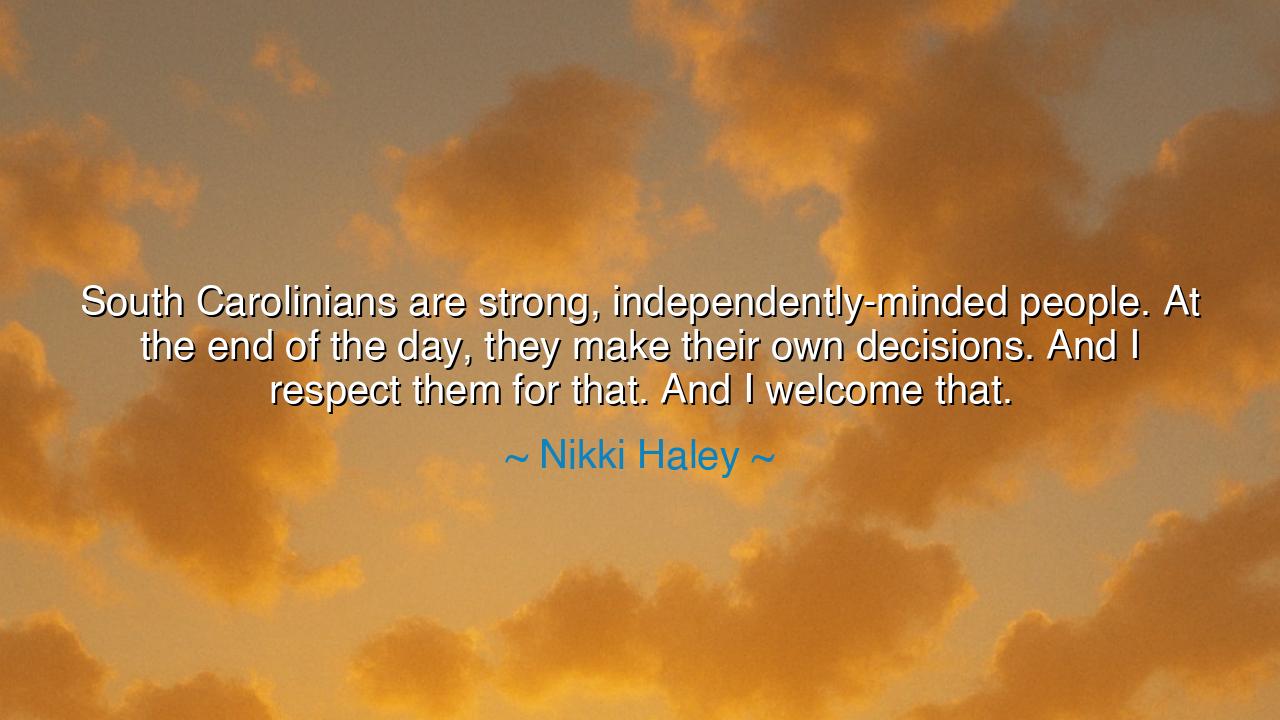
South Carolinians are strong, independently-minded people. At the
South Carolinians are strong, independently-minded people. At the end of the day, they make their own decisions. And I respect them for that. And I welcome that.






When Nikki Haley proclaimed, “South Carolinians are strong, independently-minded people. At the end of the day, they make their own decisions. And I respect them for that. And I welcome that,” she spoke not only of a people in a single state, but of a universal spirit: the spirit of independence, of self-determination, of the courage to stand by one’s own judgment. Her words carry with them the fragrance of history, for South Carolina has long been a land where fierce will and resolute character have shaped its destiny.
The phrase “strong, independently-minded people” recalls a truth the ancients often celebrated: that strength is not measured by muscle alone, but by the ability to think, to choose, and to act without bending to the tyranny of others. In every age, communities rise or fall depending on whether their people surrender to conformity or stand boldly in their own convictions. Haley’s words honor this timeless quality—the dignity of those who make their own decisions, even in the face of opposition.
The story of South Carolina itself reflects this fierce independence. It was one of the earliest colonies to rise against Britain during the American Revolution, with battles such as Sullivan’s Island becoming legendary for courage against overwhelming odds. The Palmetto tree, now the state’s proud symbol, comes from those days, when fortifications of palmetto logs withstood British cannon fire. That moment, carved into the state’s memory, revealed the very trait Haley celebrates: a refusal to bow, a determination to decide one’s own fate.
Yet her words also carry humility: “I respect them for that. And I welcome that.” Here, she acknowledges that leadership does not mean commanding obedience, but honoring the will of the people. This echoes the wisdom of Marcus Aurelius, who wrote that a ruler is not a master but a servant of the common good. Respecting the independent will of the people is not weakness, but the highest form of strength—for it trusts in the wisdom of the community and affirms their dignity as free individuals.
Consider also the parallel of ancient Athens, where citizens gathered to deliberate their own laws. They did not wait for kings to decree their path; they decided together, even when decisions were difficult, even when mistakes were made. The value lay not only in the outcome, but in the act of choosing freely. So too does Haley’s statement remind us that the heart of democracy lies in self-determination, even when choices bring challenge or conflict.
The lesson for us is clear: independence is both a privilege and a responsibility. To be strong and independently minded is to carry the weight of one’s decisions, to accept not only the rewards but also the burdens they bring. True freedom is not recklessness, but the disciplined courage to live by convictions and respect the freedom of others to do the same.
Practical wisdom follows: cultivate independence in your own life. Do not surrender your choices to fear, to peer pressure, or to the tides of popular opinion. Weigh your decisions with care, stand firm in them with honor, and extend respect to those whose paths differ from yours. In doing so, you live not as a follower of the crowd, but as a free soul, worthy of respect and remembrance.
Thus Haley’s words, though spoken of South Carolinians, speak to all people. Strength, independence, respect, and welcome—these are the cornerstones of a free and noble society. Let us strive to embody them in our own lives, so that we may stand not only as members of a nation, but as guardians of freedom itself, passing its flame to the generations yet to come.






AAdministratorAdministrator
Welcome, honored guests. Please leave a comment, we will respond soon